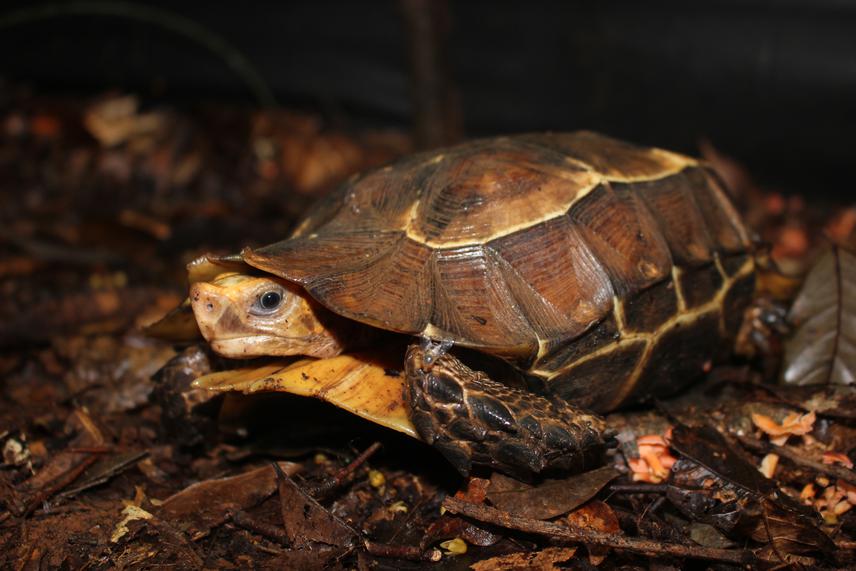Ohene Boakye Adomako
Other projects
12 Mar 2014
Survey and Conservation Status of Two Threatened Hinge-backed Tortoises (Kinixys homeana and K. erosa) in South-Western Ghana
23 Mar 2017
Conservation Action for the Two Endangered Hinged-Backed Tortoises (Kinixys homeana and K. erosa) in South-Western Ghana
This project focusing on Tano-Offin Forest region, a stronghold of the two endangered hinge-backed tortoises, seeks to:
(1) train tortoise-hunting families to farm mushrooms as alternative livelihood;
(2) improve the skills of local people to monitor hunting activities; and
(3) intensify educational campaigns to reconnect local people with tortoises and their habitats.

Home's hinge-back tortoise (Kinixys homeana) encountered during field surveys in the forest. © Ohene Adomako.
Over the years we have accrued important data along with launching parallel conservation education to reduce tortoise consumption in south-western Ghana. This project was developed based on our second RSG’s recommendations to promote sustainable economic livelihoods for tortoise-hunting families and strengthen the involvement of indigenous people in tortoise conservation. Thus, on our last RSG, 76.67% (46) of 60 hunting households interviewed in the Tano-Offin forest region (stronghold of the two Kinixys species) were willing to abandon tortoise hunting for sustainable livelihood options. This proposed project will pilot a mushroom farming program-the most favoured alternative livelihood option-to support families that depend on tortoises and their habitats in the Tano-Offin forest region.
Generally, there is widespread poverty in Ghana. We believe that using tortoises as symbols of poverty alleviation will make them more popular, thus local people will be obligated to protect tortoises and their habitats. This project will train and equip poor families in mushroom farming. Thus, by farming mushrooms, poor families who depend on tortoises for survival will have access to alternative protein source and increased incomes from selling their mushrooms. They will be empowered through mushroom production by acquiring sustainable farming skills and financial independence. This will directly curb the frequent hunting of tortoises. In fact, tortoises’ highest capture rates coincide with the wild mushroom season; during this period local people target tortoises while they hunt for edible wild mushrooms, which are also consumed by tortoises.
Through this project, we will also boost the skills and morale of Tortoise Guardians (five-member monitoring team of local experts, established on our 2nd RSG) to sustain community patrols and awareness creation.
In addition, this project is timely because of imminent bauxite mining threat in the Tano-Offin Forest reserve (https://www.ghanaweb.com/GhanaHomePage/business/65-Civil-Society-Organisations-oppose-China-s-US-15bn-bauxite-development-plan-in-Ghana-683540). We will thus, educate stakeholders and make available scientific data to mainstream the conservation needs of tortoises in mining activities.